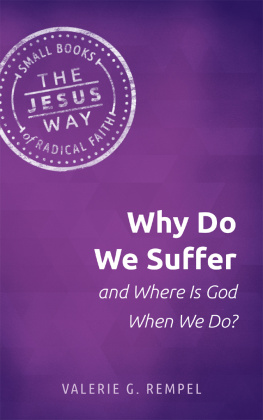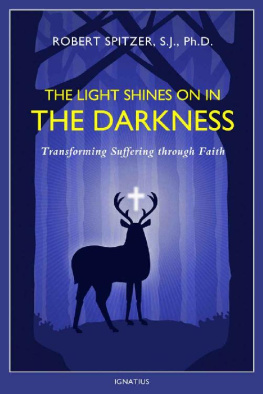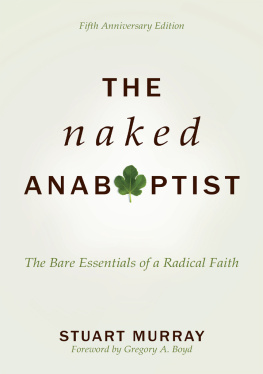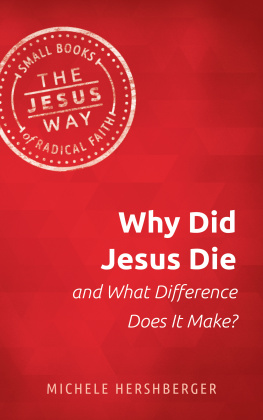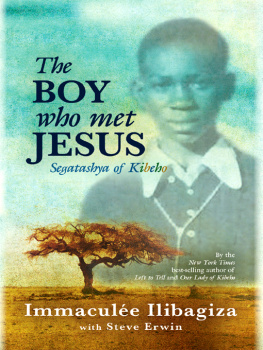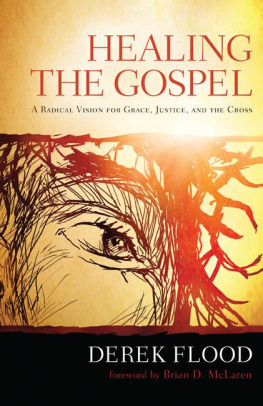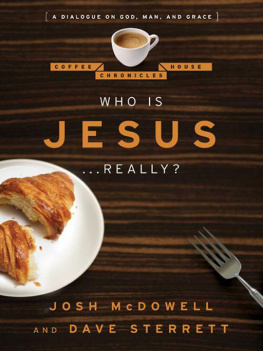Contents

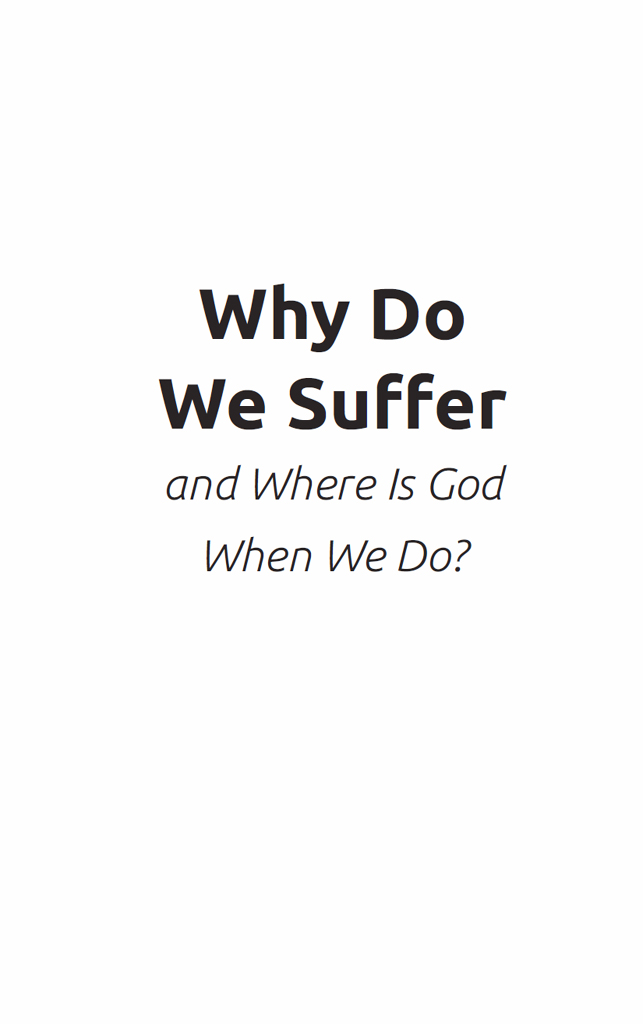

Herald Press
PO Box 866, Harrisonburg, Virginia 22803
www.HeraldPress.com
Library of Congress Cataloging-in-Publication Data
Names: Rempel, Valerie G., author.
Title: Why do we suffer and where is God when we do? / Valerie G. Rempel.
Description: Harrisonburg, Virginia : Herald Press, 2020. | Series: The Jesus way: small books of radical faith | Includes bibliographical references.
Identifiers: LCCN 2020000276 (print) | LCCN 2020000277 (ebook) | ISBN 9781513805672 (paperback) | ISBN 9781513806167 (ebook)
Subjects: LCSH: Suffering--Religious aspects--Christianity. | Suffering--Biblical teaching. | Theodicy.
Classification: LCC BT732.7 .R46 2020 (print) | LCC BT732.7 (ebook) | DDC 231/.8--dc23
LC record available at https://lccn.loc.gov/2020000276
LC ebook record available at https://lccn.loc.gov/2020000277
WHY DO WE SUFFER AND WHERE IS GOD WHEN WE Do?
2020 by Herald Press, Harrisonburg, Virginia 22803. 800-245-7894.
All rights reserved.
Library of Congress Control Number: 2020000276
International Standard Book Number: 978-1-5138-0567-2 (paperback); 978-1-5138-0616-7 (ebook)
Printed in United States of America
Cover and interior design by Reuben Graham
All rights reserved. This publication may not be reproduced, stored in a retrieval system, or transmitted in whole or in part, in any form, by any means, electronic, mechanical, photocopying, recording or otherwise without prior permission of the copyright owners.
Unless otherwise noted, Scripture text is quoted, with permission, from the New Revised Standard Version , 1989, Division of Christian Education of the National Council of Churches of Christ in the United States of America.
Scripture quotations marked (KJV) are taken from the King James Version of the Bible.
24 23 22 21 2010 9 8 7 6 5 4 3 2 1

Introduction to The Jesus Way Series from Herald Press
T he Jesus Way is good news for all people, of all times, in all places. Jesus Christ is before all things, and in him all things hold together in him all the fullness of God was pleased to dwell (Colossians 1:17, 19). The Jesus Way happens when Gods will is done on earth as it is in heaven.
But what does it mean to walk the Jesus Way? How can we who claim the name of Christ reflect the image of God in the twenty-first century? What does it mean to live out and proclaim the good news of reconciliation in Christ?
The Jesus Way: Small Books of Radical Faith offers concise, practical theology that helps readers encounter big questions about Gods work in the world. Grounded in a Christ-centered reading of Scripture and a commitment to reconciliation, the series aims to enliven the service and embolden the witness of people who follow Jesus. The volumes in the series are written by a diverse community of internationally renowned pastors, scholars, and practitioners committed to the way of Jesus.
The Jesus Way series is rooted in Anabaptism, a Christian tradition that prioritizes following Jesus, loving enemies, and creating faithful communities. During the Protestant Reformation of the 1500s, early Anabaptists who began meeting for worship emphasized discipleship in addition to belief, baptized adults instead of infants, and pledged their allegiance to God over loyalty to the state. Early Anabaptists were martyred for their radical faith, and they went to their deaths without violently resisting their accusers.
Today more than two million Anabaptist Christians worship in more than one hundred countries around the globe. They include Mennonites, Amish, Brethren in Christ, and Hutterites. Many other Christians committed to Anabaptist beliefs and practices remain in church communities in other traditions.
Following Jesus means turning from sin, renouncing violence, seeking justice, believing in the reconciling power of God, and living in the power of the Holy Spirit. The Jesus Way liberates us from conformity to the world and heals broken places. It shines light on evil and restores all things.
Join Christ-followers around the world as we seek the Jesus Way.
Introduction
I t was, to paraphrase Alexander of childrens book fame, a terrible, horrible, no good, very bad year. A high school friend died of cancer and another landed in the hospital with what turned out to be metastatic breast cancer. She would die the following year. A much-loved aunt succumbed to the ravages of Parkinsons disease and died during the Christmas season. We postponed her funeral so another aunt could have surgery for her recently diagnosed cancer. My workplace was in turmoil and a friend was so angry at me that, for a short season, we could not celebrate the Lords Supper together. And one fall day, I received a phone call from my father telling me that he was in the hospital being diagnosed with lung cancer. And here you should imagine my stepmothers voice in the background saying, Dont forget to tell her happy birthday.
Suffering, of course, comes in many forms. I listed a series of personal griefs that were made more sorrowful because I had survived cancer only to lose my mother to that disease a few years later. Perhaps you or someone you love is dealing with another kind of physical or mental health issue. Perhaps you have or are experiencing the pain of infertility, or the loss of a loved one through death or broken relationship. Perhaps you are caring for someone who is suffering and are finding it hard to know how to offer comfort. Perhaps you simply dont know how to make sense of the news, which is so often filled with stories of senseless tragedy.
If you have picked up this book, you probably have your own version of a difficult season of life. Perhaps you are still in the midst of it and are asking the question that is at the heart of this small book: Why do we suffer, and where is God when we do? If so, I hope you will find some helpful ways to think about this question and, ultimately, affirm faith in the God who sustains us even in the midst of our darkest days. I hope this little book will help you think more Christianly about these matters. I do believe that God is with us even and especially in the midst of our suffering and sorrow.
1
Why Does Suffering Exist?
T here are days when everything seems too much. Between the daily news and our own sorrows, we are tempted to either pull the bedcovers up over our heads or simply collapse, wailing until we are exhausted. The questions rise from the depths. How could this happen? How can we bear another sorrow? Why wont God answer our prayers for relief? Enough is enough, already!
In the face of a suffering world or when overwhelmed by personal pain or grief, we ask what must be one of the most frequently asked questions for people of faith: If an all-powerful and loving God exists, why is there so much suffering in the world?
This is a book about suffering. It seeks to guide readers in exploring the questions we have when faced with pain and sufferingour own, and that of others. Thinking about these questions is essential work for people of faith because the problem of suffering, and of evil itself, is one that confronts us all. When it does, we often struggle to reconcile our belief in the goodness of God with what seems like such pointless and unnecessary suffering. The technical term for exploring these questions is theodicy . (Key terms appear in bold and are defined in the glossary.) Theodicy is the attempt to answer the questions that arise when we think about God in relationship to human suffering.

